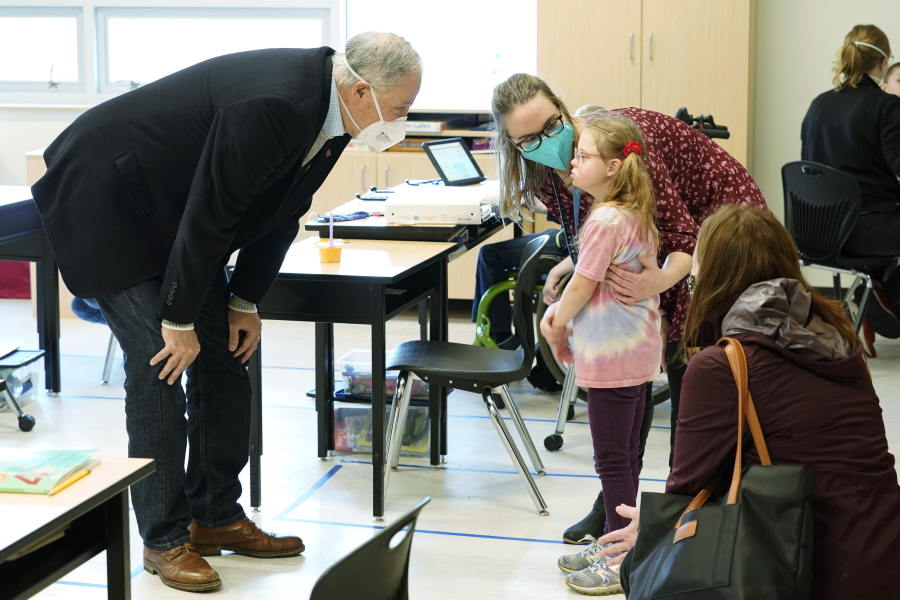Kids in Washington aren’t required to attend school until they’re 8 years old, the latest age of any state in the country.
For the second time in the last decade, state lawmakers are seeking to make a change.
A new bill pre-filed for the legislative session, which begins Monday, Jan. 10, would lower the minimum age to 5 years old, effectively mandating kindergarten for all kids either in the public, private or home-schooled setting.
The current law “is so antithetical to our focus and concept of early learning [and] the importance [of reading] before third grade,” said state Sen. Lisa Wellman, D-Mercer Island, one of the bill’s sponsors. “That just sends a ridiculous message.”
There is no particular reason for the timing of this bill, Wellman said. The chair of the Senate’s Early Learning & K-12 Education Committee, Wellman wasn’t even aware of this peculiarity in the law until a conversation she had with a member of The Seattle Times editorial board, which called for lowering the minimum age last September.
The bill could face opposition from parents who home-school their children because it would require them to begin submitting required paperwork about how they teach their children at age 5.
Kayleen Corrigan, a mother in Covington, has home-schooled her six children for the past eight years. She’s among many families in the Washington Homeschool Organization who have expressed concern about the proposal and question lawmakers’ motivations for wanting them to declare their intent and develop formal lesson plans earlier.
“If there are massive problems with kids showing up from home-school unprepared, that’s understandable. But show us the data,” she said.
Wellen said she doesn’t think the proposed change in school age would interrupt what home-schooling parents are trying to do.
“I have heard from people who do have their kids in home and want to maintain home schooling, and for some reason they feel threatened by it,” she said.
Twelve other states begin requiring formal schooling at age 5, and 26 states start at age 6, including Oregon and California. The remainder start at 7 years old. Pennsylvania’s compulsory age was once the same as Washington’s, but in 2019 lawmakers there bumped it down to 6 years old.
Some studies point to improved outcomes for kids who start receiving education even earlier than kindergarten, especially for kids of color and kids living in poverty. One study found graduates of a universal pre-K program in Tulsa, Oklahoma, performed better in math and were less likely to repeat a grade eight years later compared with their peers who weren’t enrolled in the program. Other research has linked higher lifetime earnings to early childhood learning programs.
Washington was recently lauded for its investments in early childhood care, including its expansion of child care subsidies and early options for Head Start, the federally funded early childhood development program for low-income families.
It’s unclear just how many kids end up starting schooling at 8 years old. Wellman suspects the number isn’t high.
Around 78,600 kids between the ages of 5 and 8 enrolled in public schools for the first time this past fall. Just 4% of those kids entered at 8 years old.
But the state doesn’t know if the children who started public school at 8 years old received formal schooling in another setting — either through a school in a different state, home schooling, or private school — so these figures might not paint a completely accurate picture.
Over the course of the pandemic, the state did see a substantial drop in the number of kindergartners, who start at age 5, and first graders enrolled in public schools between 2019 and 2021. Some of that drop could be the result of parents choosing to wait out the pandemic before enrolling their children in school, state officials have suspected.
Some home-schooling families say they’ve enjoyed the flexibility of the current law, and don’t want to see it change.
“Formal lessons in the earliest years seem to hinder creativity, stifle their enthusiasm for learning and dampen their spirits,” Corrigan said.
Research supports that play is essential for child development, but formal lessons don’t necessarily preclude kids from engaging in play activities.
The bill would move up the age at which parents would need to follow state rules governing home schooling, namely the requirement that they teach certain subjects and submit a yearly notification to the state about their child’s home-schooling status.
Corrigan has written plans for all her school-age kids. Her children range in age from 18 months to 13 years old, with the eldest attending seventh grade online.
A typical day starts with breakfast as a family before Corrigan’s husband, Mike, who was also home-schooled as a child, heads to their home office and the older children go to a designated home-school room to work on their studies.
The younger children, including the toddler, a 5-year-old and 7-year-old, tend to spend days playing and learning at their own pace, Corrigan said — snuggling, reading or doing workbooks on the couch.
Corrigan said Penny, her 5-year-old, already picks out books for practice. “She wants to read because her siblings read,” the mother said.
Before age 8, Corrigan said, her younger kids “learn so much by osmosis and by just being part of the daily rhythms of family life. It works out much better than making them sit for lessons.”
Corrigan said if the law changes, she would comply.



